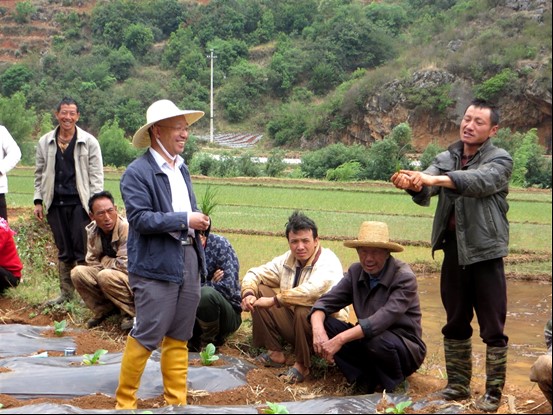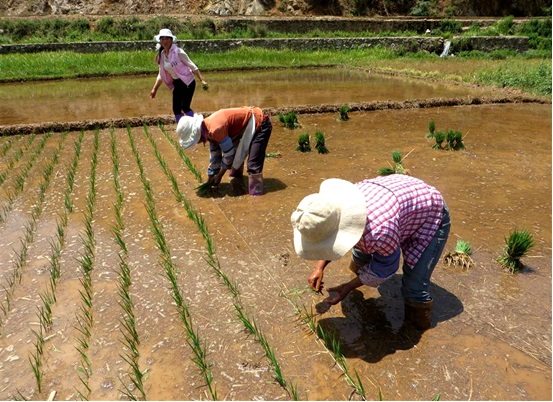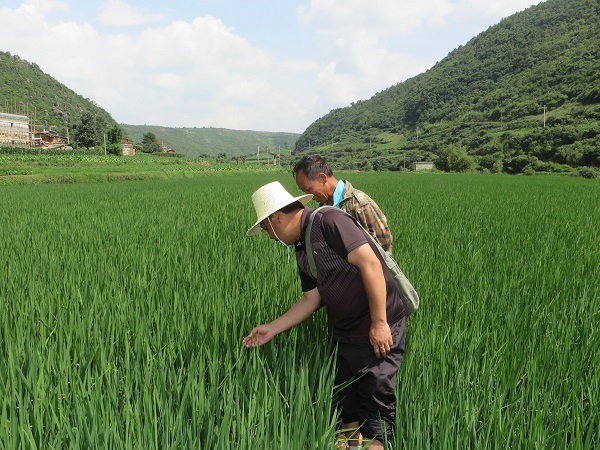Home \ Project News \ The Progress of Farmer's Clubs Xundian Project
Climate Smart Agriculture is a project funded by Blue Moon Fund and is operating in Xundian Hui and Yi Autonomous County in Yunnan. The project was officially launched on the 1st of January 2015 and is a two year program which will run until December 2016. The project is designed following the Humana People to People concept of Farmers’ Clubs. The project operates in two administrative villages covering a total of 400 households. The Climate Smart Agriculture Project advocates for the involvement of farmers in taking a lead on achieving positive results on carbon emission reduction and teaching the farmers climate change adaptation strategies. The project aims at improving the capacity of 400 farmers, local government institutions and other stakeholders for implementing and promoting sustainable agricultural land management and climate smart agriculture. The project aims as well at increasing household crop production and income and to help farmers enter into the carbon market. It also advocates for the restoration of soil health and local ecology through a decrease in the use of fertilizer and pesticides, crop diversification, inter-cropping and incorporating crop residues to increase soil carbon.
On the 11th of April the project attended a workshop which was conducted by the Yunnan Academy of Scientific and Technical Information.
The participants included the Wang Xiaoli, Gu Jianlong and Feng Xin from the CDM Center of Yunnan Academy of Agricultural Sciences and Lei Baokun from the Provincial Academy of Agricultural Enviroment and Resources Institute,Ole Bloch from Humana People to People Kunming Project Service Center , Sheng Xia, Liu Pinyin and Xiang Songjun from Xundian Project Office. The workshop was focused on how to solve the problem of calculating measurements of carbon emissions and carbon emission reduction and other issues in line with helping the farmers understand more about Climate Smart Agriculture. At the workshop project manager Sheng Xia made a presentation of the activities carried out in 2015 and first quarter of 2016. She made an appeal to the gathered experts on working together in finding ways to calculate the carbon emissions, carbon emission reductions and carbon storage increase in soil. Gu Jianlong from CDM Center explained the methods used during 2015 to measure and calculate emissions of SRI rice cultivation and the results obtained. Lei Baokun from the Provincial Academy of Agricultural Enviroment and Resources Institute explained estimation methods which are used in many projects instead of expensive measuring methods. Measuring often has to be done over many years which doesn’t fit to the two years project in Xundian.
A method of CDM Center measuring on-spot emission from SRI rice planting through hand held methane measuring devices combined with Lei Baokun’s estimations regarding other initiatives was suggested as a feasible way to know the projects emission reduction.
In the same month of April beside carbon balance improvements the project handled various other activities such as purchasing rice and maize compound fertilizer which was distributed to 239 households with each household receiving a total of 40kgs. The project staff regularly visited the households to check on beans and potato production. After having trained the farmers on how to plant beans and no-tillage potatoes the project staff paid visits to each household to check on the progress of these plants. The 121 acres of beans matured and grew well but there was a minor emergence of red spot disease. To make sure the problem was resolved the project invited Mr. Zhao Xu from Xundian County Plant Protection Station to come and check on the plants. Mr Zhao taught the farmers about the preventive measures they should follow to do away with the red spots. The farmers thought the yield was good since it was their first time to plant broad beans in the area. The potatoes grew well but the analysis was that due to cold weather the yield was affected. The project staff also checked on the growth of the rice seedling and they invited Mr. Zhao who further gave training to a total of 432 farmers on the management of the seedlings, quantitative knowledge in rice cultivation and environmental protection. The training consisted of how to prevent the rice seedlings from becoming rotten, managing the water levels, identifying the weevil beetle and control measures to be taken in such occurrences. 
Instructions of SRI by professor Yang Congdang
Paddy rice transplanting

